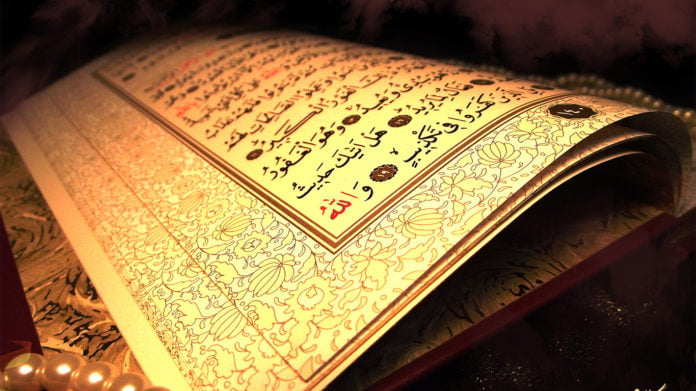| 1) By the night when it enshrouds, 2) by the day when it appears in full splendour, 3) and by Him who created the male and female:* 4) surely your striving is for diverse ends. |
In this chapter Allah takes an oath by the times in which the servants, in all their differing circumstances, perform their deeds. By the night when it enshrouds, its darkness falling on creation, and man takes his repose, resting from toil and labour.By the day when it appears in full splendour, illuminating creation. In its light, people leave their houses seeking their livelihood. And by Him who created the male and female, it is possible that this be the meaning in which case Allah is taking an oath by His noble self, i.e. He created male and female. It is also possible that the meaning be, and by the creation of the male and female in which case the oath is by His creation. His all encompassing wisdom is exemplified here in His creating every species in pairs, male and female. In order for them to propagate, He has led one to be naturally attracted to the other and has made the male and female of each species compatible with the other, so blessed be Allah, the best of creators![1] Surely your striving is for diverse ends, this is the point of the oaths: man, responsible for your deeds, your efforts are greatly disparate because of the huge differences in your actual works, the amount of them, the energy expended in doing them, the desire to perform them, and in their goals: are they for eternal face of Allah, the Most-High, or are they for some temporal objective soon to disappear? If it is the first case, the deed will endure forever but if it is the second case the deed would come to an end as soon as the goal is reached. This holds true for every deed that is done for other than the face of Allah.
This is why Allah gave a degree of eminence to those who work (for His sake) by saying:
| 5) As for him who gives and is mindful of Allah 6) and believes in the Good; 7) We will pave his way to Ease. 8) But as for him who is niggardly and deems himself self-sufficient, 9) and denies the Good; 10) We will pave his way to Adversity. 11) His wealth will not help him when he plummets to the depths. |
As for him who gives, of what he has been commanded subsuming acts of worship linked to wealth: zakat, charity, expiation and spending in ways of goodness; and acts of worship linked to the body: prayer, fast etc.; and those acts of worship that combine both: Hajj, `Umrah etc. and is mindful of Allah by staying away from all that Allah prohibited. And believes in the Good, i.e. believes in ‘None has the right to be worshipped save Allah’ and all its related beliefs and requirements. We will pave his way to Ease, we will smooth his affair, and make the performance of good and the avoidance of evil easy for him. This is because he met the requirements for ease so Allah smoothed his way to that ease. But as for him who is niggardly in doing what he has been commanded, leaving off the obligatory and recommended spending, and not permitting his self to fulfil its obligations to Allah and deems himself self-sufficient, in no need of Allah. As such he abandons servitude to Allah and does not view himself to be utterly and completely dependant on Allah. There is no victory and success for the soul unless Allah be its beloved and its object of worship, for whose sake it performs deeds, and towards whom it turns. And denies the Good, that Allah has enjoined His servants to: correct beliefs. We will pave his way to Adversity, the state of adversity and all despicable traits will be made easy for him. We ask Allah or well-being! His wealth, which made him take the path of inordinacy, which made him think he was self-sufficient, which made him niggardly, will not help him when he plummets to the depths, i.e. when he is destroyed and dies because at that time nothing accompanies man save his deeds. His wealth from which he did not give what was obligatory for him will be a source of anguish because he never used it to prepare for his Hereafter.
| 12) Providing guidance is up to Us 13) and the Last and the First belong to Us. 14) I have warned you of a raging Fire 15) in which only the most wretched will roast: 16) those who denied and turned away. |
Providing guidance is up to Us, i.e. the path of guidance leads one to Allah and draws one close to His good-pleasure. As for misguidance, its paths are barred from Allah and they lead the one traversing them to severe torment. The Last and the First belong to Us, it belongs to Us and We can do with it as We will, He has no partner in it so let the desirous turn to Him when seeking something and sever their hopes in the objects of creation. I have warned you of a raging Fire in which only the most wretched will roast: those who denied the truth and turned away, from the ordinances.
| 17) The one most mindful of Allah will be spared it: 18) he who gives his wealth to purify himself, 19) not to return a favour to anyone, 20) desiring only the face of his Lord, Most High. 21) He will certainly be well-pleased. |
The one most mindful of Allah will be spared it: he who gives his wealth to purify himself, from sins and filth, seeking thereby the face of Allah. This then proves that if spending in a recommended way causes one to leave the obligation of repaying debts, or spending in ways that are obligatory upon him, this recommended spending is not legislated for him, rather, in the view of many of the scholars, this spending of his would be rejected because he sought to purify himself with a recommended deed at the expense of an obligatory deed.
not to return a favour to anyone, meaning that there is no one who done him a good turn requiring a return except that he has returned it. Perhaps they are even left owing him but he did what he did for the sake of Allah alone because he is in dire need of His beneficence and His alone. Whoever still has to return a favour will eventually do some turn for them that may be a cause for a decrease in his sincerity to Allah. This verse was revealed concerning Abu Bakr: everyone who had done him a favour had been repaid, even the Messenger of Allah ﷺ, with the obvious exception of the blessing that came as a result of his being a Messenger which cannot possibly be repaid: the blessing of Islam and receiving guidance. In this respect Allah and His Messenger have a blessing over everyone that can never be repaid. However, this said, the verse is general and applicable to everyone who has this quality. Therefore, such a person has nothing left that he must repay to any object of creation and as such all his deeds are entirely and sincerely for Allah, Most High. This is why He says, desiring only the face of his Lord, Most High. He will certainly be well-pleased, with what Allah will grant him of favour and reward.
Endnotes
* Another interpretation is, and the creation of the male and female. [Abu Hayyan]
(NOTE: If you want to build a strong and powerful relationship with Allah, check out Islamia TV, where you can watch Islamic speakers from across the globe deliver inspiring and motivational courses. Learn more at www.islamia.tv.)




















